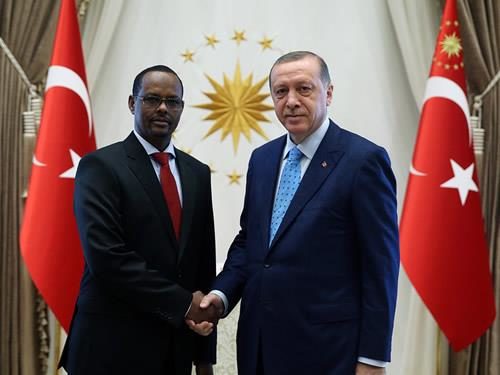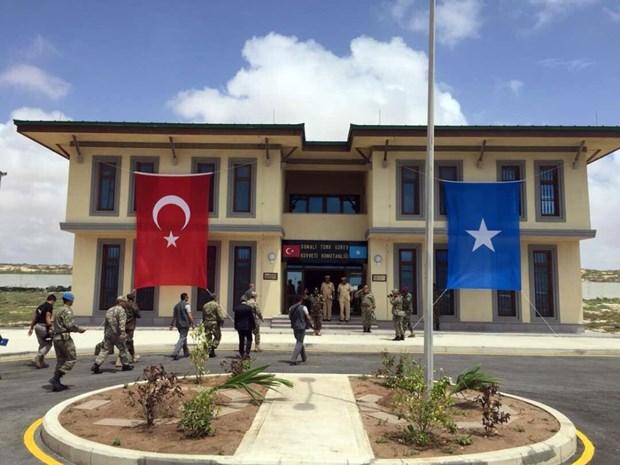www.aljazeerah.info
Opinion Editorials, May 2020
Archives
Mission & Name
Conflict Terminology
Editorials
Gaza Holocaust
Gulf War
Isdood
Islam
News
News Photos
Opinion Editorials
US Foreign Policy (Dr. El-Najjar's Articles)
www.aljazeerah.info
Turkey-Somalia relations: Opportunities and patterns for collaboration By Jama A Mohamed Daily Sabah, May 13, 2020 |
 |
 |
| Somali ambassador Jama A Mohamed and President Erdogan | Turkish base in Somalia |
Since the first case of COVID-19 was confirmed in Somalia on March 16 this year, Turkey has sent four planes full of medical equipment, including intensive care unit (ICU) beds, ventilators, personal protective equipment (PPE), surgical face masks, face shields and other useful materials, to the country. This medical equipment will help the Somali people in fighting the pandemic and will enhance the government’s efforts to contain the pandemic. It enables the government to strengthen and build up the fragile health infrastructure of the country, which is already grappling with and burdened by the surge in the number of COVID-19 patients.
This generous move by Turkey once again reinforced the brotherly relationship between the two countries and demonstrated the Turkish government's assiduous efforts in helping the government and people of Somalia in difficult times. The Somali government and its people have been very grateful for Turkey’s generosity and swift response, not only in this pandemic, but also in every emergency situation that the Somali people have encountered in recent years. The quick deployment of much-needed medical equipment at this critical time in Somalia has demonstrated and is a clear testimony to the unique Turkish humanitarian diplomacy model toward Somalia.
The quick and pragmatic humanitarian intervention of Turkey in Somalia is driven by the moral imperative of assisting its brotherly nation. It is a principle that is enshrined in humanity and empathy and emphasized by cultural proximity, historical relations and a friendship of two nations that dates back to the 15th century.
In a testament to this, on July 15, 2016, when the failed coup attempt against Turkey’s democratic institutions was underway, Somalia and its citizens were among the first to show solidarity with the Turkish government, its people and the victims of the failed attempt in which 250 people were killed and more than 2,000 were injured.
While bilateral ties between our nations date back centuries, the contemporary diplomatic relations started in 1979 when the first Somali and Turkish embassies were respectively established in both countries. Today, Turkey has its largest diplomatic mission in Somalia. Over the last decade, more than any other country, Turkey has taken on an influential role for Somali citizens as it has worked to combat famine, improved health care, invested in agricultural development, renovated dilapidated roads in Mogadishu, provided generous scholarships to students, built schools and implemented many public services development projects across the country, along with other crucial projects aimed to revive government institutions.
More broadly, Turkey has taken a comprehensive approach to telling the world about Somalia's predicament. A harbinger of this was when President Recep Tayyip Erdoğan, then prime minister, said in a 2011 speech at the U.N. General Assembly, “No one can speak of peace, justice and civilization in the world if the outcry rising from Somalia is left unheard.” Within this framework, Turkey and Somalia developed deep-rooted and rare sociopolitical relations, which compelled Turkey’s contribution to political dialogue and security reform. The multidimensional assistance of Turkey has facilitated the end of the international isolation of Somalia and enhanced its political stability, which helps exterminate its entrenched problems. Therefore, Turkey’s model in Somalia is different from the conventional mechanism of simply delivering assistance, defying the international “pseudo-politics of kindness.” Since then, Erdoğan has spoken about the Somali situation in many platforms, including at the U.N. and the Organisation of Islamic Cooperation (OIC).
On security matters, Turkey opened a military training base in Somalia, its largest overseas military training facility, on Sept. 30, 2017. The base plays a pivotal role in imparting much-needed experience to the Somali National Army (SNA) and goes a long way in building a capable, well trained and disciplined military that can effectively combat terrorist groups and defend the territorial integrity of Somalia.
Turkey has spent more than $1 billion both in cash and other donations on Somalia. This generous contribution has made most Somalis consider Turkey one of their closest allies, even among other renowned up-scale commitments from other countries. Its contribution is seen as colossal and brotherly by the majority of the public. These positive offerings by Turkey and the two nations' mutual respect for one another has enhanced the bilateral trade to more than $200 million between them. Moreover, the East African nation, with its geostrategic location and the discovery of substantial oil reserves in its mainland, sea and shores, in addition to its large tracts of fertile agricultural land and pristine coastline, has the potential for a progressive future, which Somalia and Turkey can share to sustain their strong diplomatic relations.
With the anticipated post-COVID-19 economic bloom, the alliances, economic partnerships and the trajectory of the world might completely change. Today, with the close relationships between Somalia and Turkey, they might enhance their platforms of knowledge exchange and experiences, and maximize their level of collaborative work in terms of trade and other bilateral relations.
Somalia is implementing key macroeconomic reforms to create an enabling and simpler business environment, which can engender Turkey’s diversified economy to invest in. As per the 9th National Development Plan (NDP-9), our priorities between 2020 and 2024 are to encourage foreign investment in manufacturing, transport, infrastructure, fisheries and energy hydrocarbons, among others, in which Turkey has a favorable experience.
Finally, I have the wish that Somalia and Turkey will have institutionalized and solid bilateral economic relations that provide ample opportunities for both of our citizens. I firmly believe that if the necessary infrastructures and investments are established in Somalia, they will have a positive impact on both nations.
On behalf of the people and government of Somalia, I would like to express our appreciation for all of Turkey's efforts in Somalia. We shall treasure all these memories dearly and hold them close to our hearts.
***
ABOUT THE AUTHOR
*Somali Ambassador to the Republic of Turkey
***
Turkey has opened a military base in Somalia as it steps up its Africa engagement
Quartz Africa, October 3, 2017
Turkey has opened its largest overseas military base in Somalia, cementing its relationship with the war-torn nation and strengthening its strategic place in the African continent.
The $50 million base was opened on Saturday (Sept. 30) and will train more than 10,000 soldiers. The move is part of an effort to institutionalize and restructure the police and military services, battle the terrorist group al-Shabaab, and help expand the government’s authority into more towns and regions. The new base also takes on an urgent significance as the 2020 withdrawal deadline for the 22,000 African Union multinational force gets closer.
By setting shop in Somalia, Turkey has become the latest country to set up a military facility in the horn of Africa nation. The United States runs clandestine operations from a base in the Lower Shabelle region, while the United Arab Emirates is expected to build a base in the self-declared region of Somaliland.
Turkey’s deepening engagement in Somalia has helped make discernible changes to the war-ravaged country in sectors ranging from health to infrastructure, education, and trade. Turkey has funneled millions of dollars in humanitarian aid to Somalia, and especially during the devastating 2011 famine that killed 250,000 people.
In 2011, current president and then prime minister Recep Tayyip Erdogan’s visit to Somalia was the first high-profile visit by a non-African head of state in almost two decades. Erdogan went on to build Turkey’s largest embassy in the world in Mogadishu. Turkey also built schools, mosques, and hospitals—including the largest medical complex in the country.
Turkey also augmented its investments, building and managing the Mogadishu port and international airport, and increasing bilateral trade to 72.3 million in 2015. Somalia also became one of Turkish Airlines’ most profitable destinations worldwide.
The military base in Somalia is also a reminder that despite Turkey’s growing regional and national problems, Africa remains central to its global expansion strategy. Since 2005, Africa has remained a policy priority for Ankara, with engagements taking place in the fields of diplomacy, trade, investment, aid, education, and security. Since 2009, Turkey has increased its diplomatic missions in Africa from 12 to 39. In 2011, Turkish Airlines flew to 14 African cities; by the end of 2017, it will operate 52 routes from Istanbul across Africa.
As David Shinn of Chatham House wrote, this increased alignment is “driven by the region’s growing economic importance to Ankara; its interest in diversifying away from the Middle East; and the apparent desire for influence among sub-Saharan Africa’s large Muslim population.”
But the congeniality with Turkey has sometimes come at a cost for African nations. Following the attempted coup in July 2016, Turkey asked several African governments to close down schools aligned with Fethullah Gulen, the self-exiled religious leader who was accused of orchestrating the failed coup. Countries like Somalia, which heavily depend on Turkish aid, closed the schools—refusing to heed the appeals of teachers, students, and workers who benefited from the school network.
***
Share the link of this article with your facebook friends
|
|
|
|
||
|
||||||


